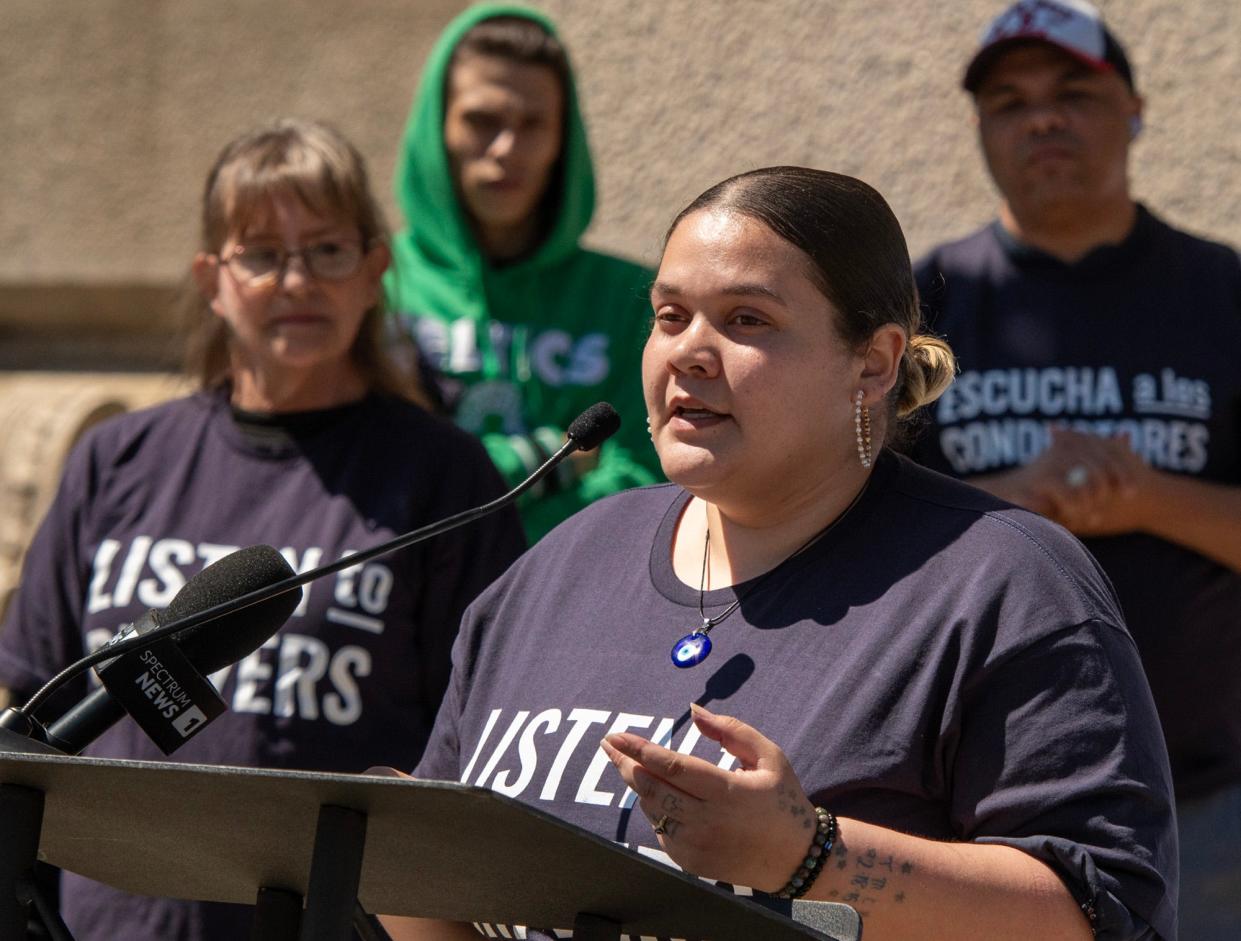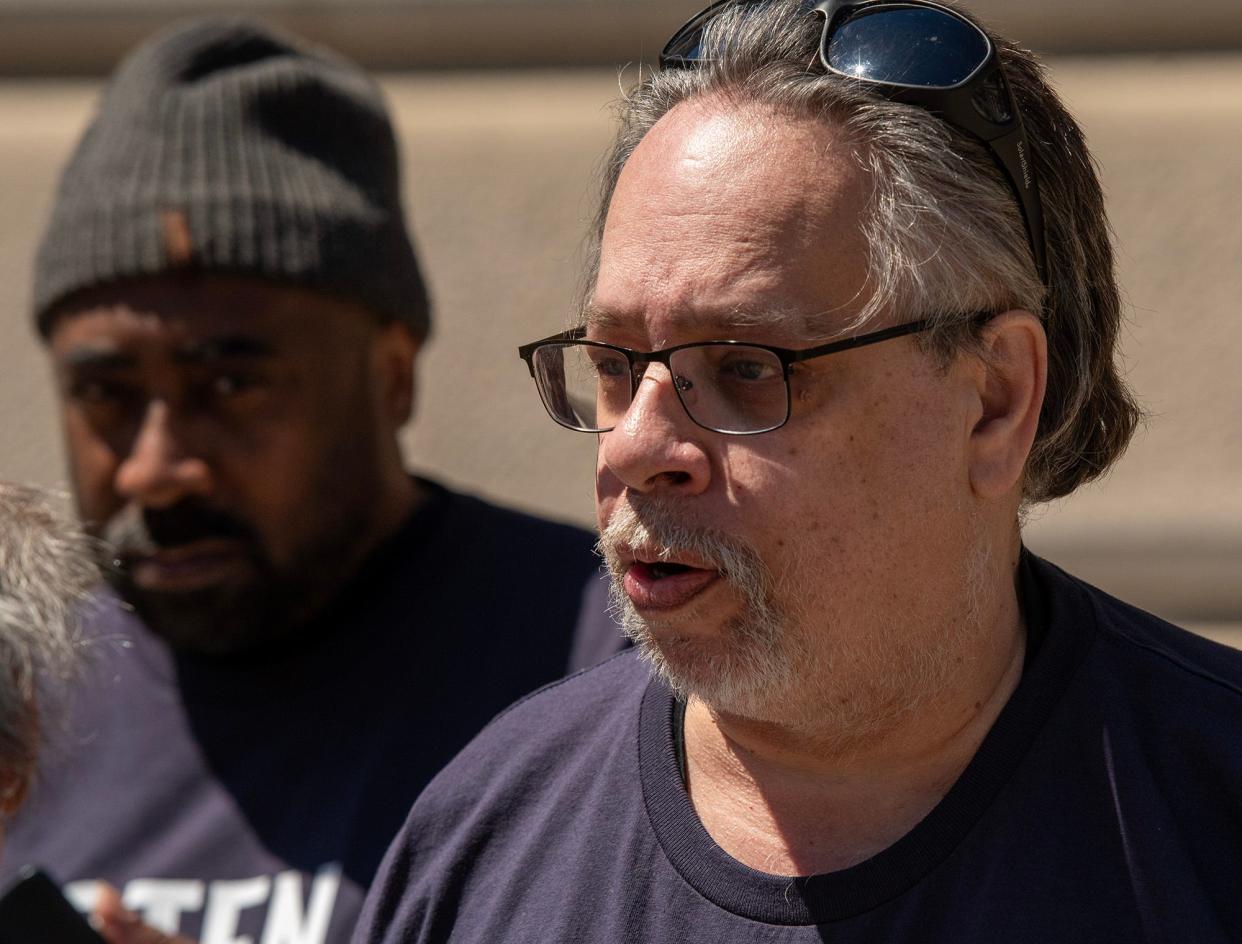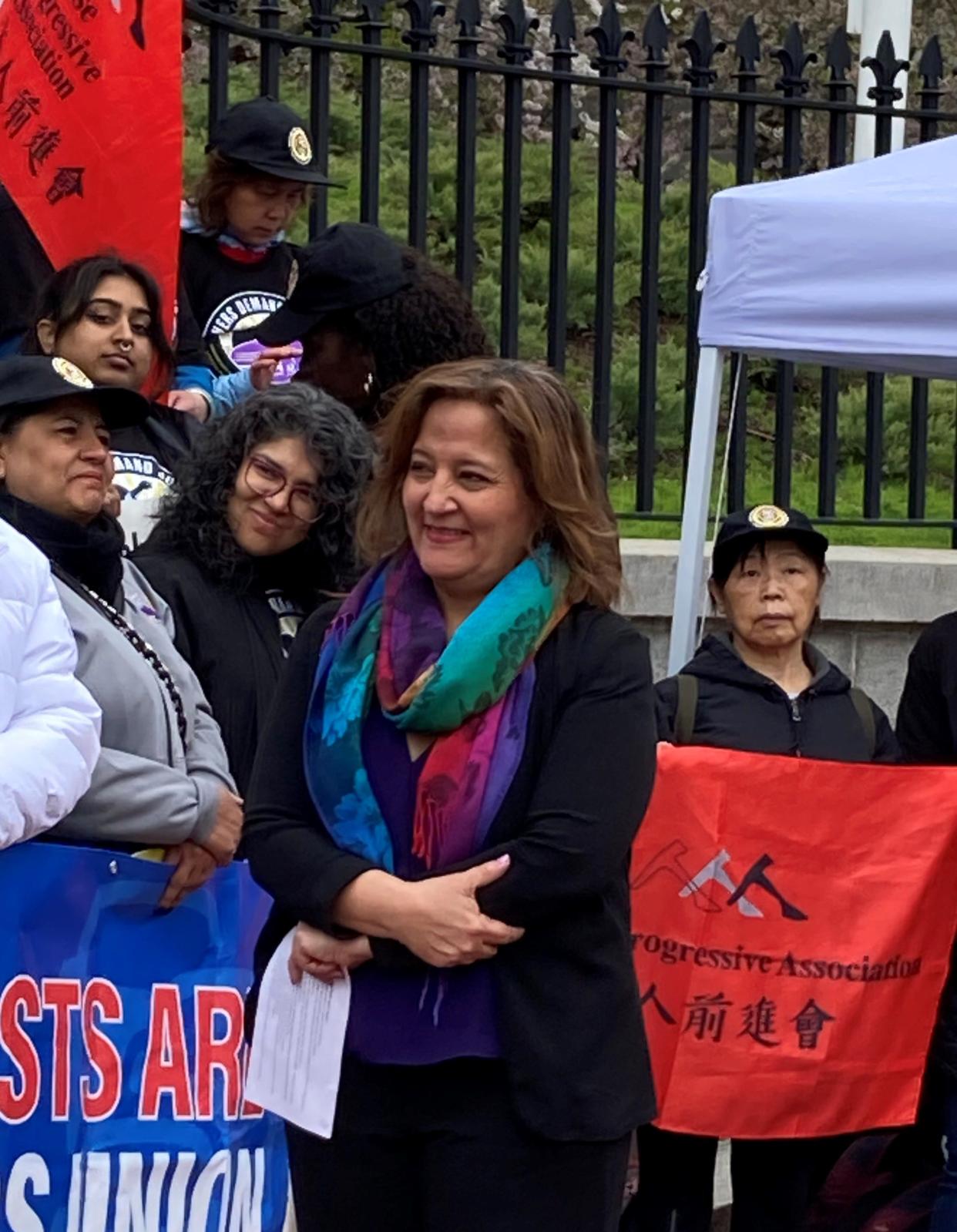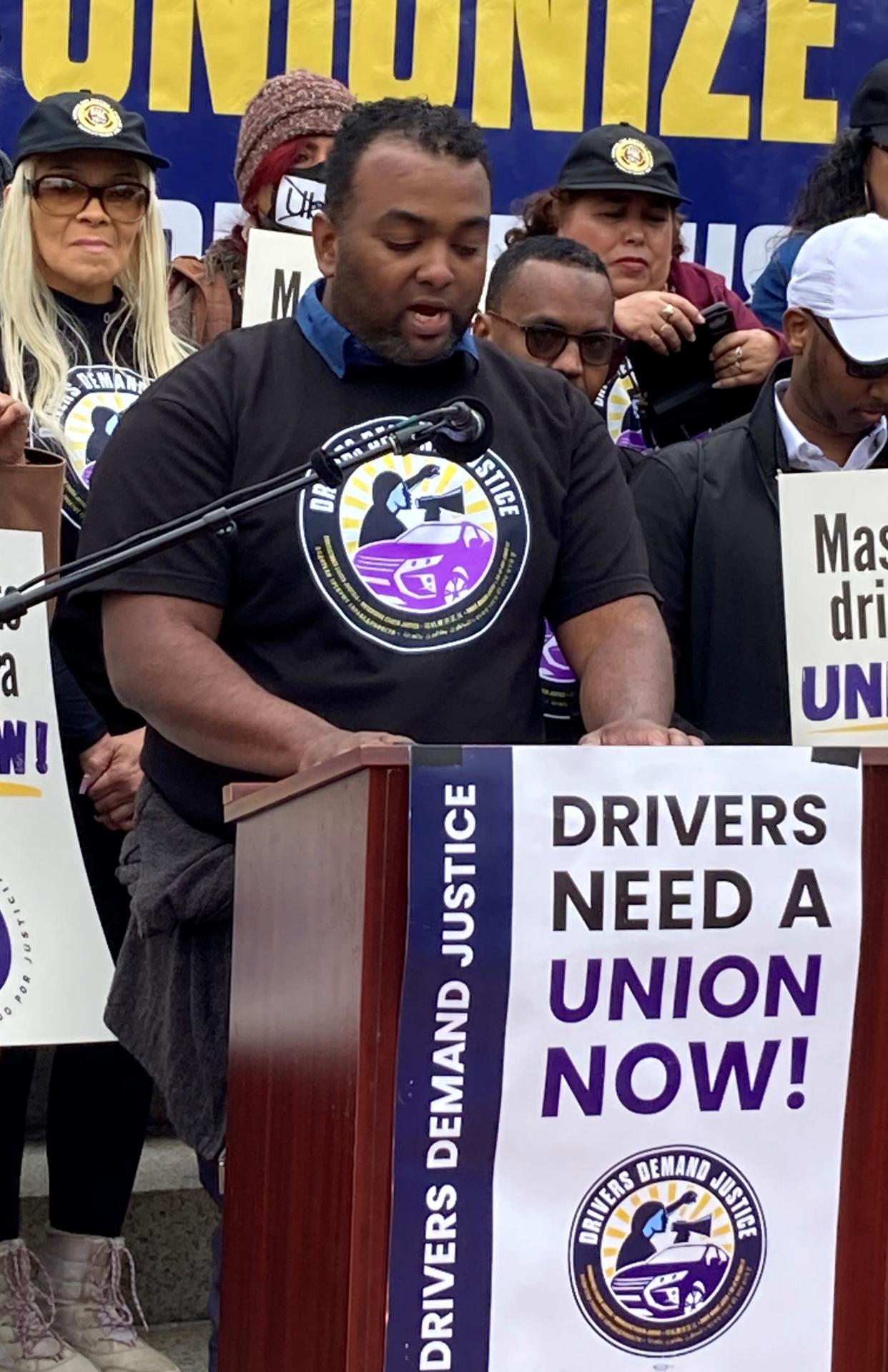'Flexibility is important': Employment status issue in rideshare ballot question with millions in state taxes on line

Two rallies this week — one outside Worcester City Hall and one on the steps of the State House in Boston — demonstrated how both sides of the debate surrounding the employment status of the state's app-based drivers, and their ability to unionize, have been working to build momentum.
In the mix are two proposed ballot questions that could be decided by voters in November, a mixture of proposed legislation and even a pending lawsuit filed by the state's former attorney general demanding that drivers be classified as employees, not as independent contractors.
That lawsuit is scheduled to be heard next month.
Some of the drivers, who turned out at the Worcester rally Tuesday, believe their work flexibility is at stake.
Peter Wise of Grafton is a musician, a handyman who offers services on the TaskRabbit app, an electrical worker and now a rideshare driver. He says he cobbles the work on apps together to eke out a decent living.

“Flexibility is important,” Wise said, explaining that under the current system he can transport a rider to Boston in the morning, work one of his other app-based jobs while in the city, then hook up with a rider to return to his home base in the evening. “I can work all of them at the same time.”
It was the mantra of the workers attending the Tuesday rally organized by the Massachusetts Coalition for Independent Work and backed by the app companies: the need for flexibility and independence, to work on their time and their schedule.
The rally in Boston Wednesday gathered union representatives, drivers and state legislators in support of the legislative measures filed to change the system.
At stake for the state is millions of dollars in revenue from payroll taxes, including payments into the unemployment insurance and disability insurance funds.
In 2022, New Jersey accepted payment of $100 million in back taxes and penalties from Uber and one of its subsidiaries after an investigation into the transportation network company by that state’s Department of Labor and Workforce Development into the employment status of drivers.
The department concluded that some 300,000 app-based drivers had been improperly misclassified as independent contractors. In Massachusetts, the state auditor is conducting a similar deep dive into the effects of classifying drivers as independent contractors on the Massachusetts budget and economy. The results of that analysis are pending.
Massachusetts taxpayers also pick up the tab when drivers apply for state aide and supports, rental assistance, SNAP benefits, MassHealth, if they can’t drive due to accidents, workplace injuries or deactivation by the tech companies that control the applications that connect drivers with customers.
Four big network transportation companies — Lyft, Uber, DoorDash and Instacart — have contributed a total of $7 million so far, according to the Office of Campaign Finance, in their push to keep drivers classified as independent contractors, through a group called Flexibility and Benefits for Massachusetts Drivers 2024.
The companies contributed $43 million behind a similar ballot initiative in the 2022 election cycle that was ultimately thrown out by the state Supreme Judicial Court based on the way the question was worded.
The faction seeking unionization has on its side big union muscle including the International Brotherhood of Teamsters and the BJ32 Service Employees International Union, among others. The organizations have joined with the coalition Drivers Demand Justice, which is looking to forge a path to unionization for the nearly 200,000 gig workers that depend on the tech transportation network companies.
Their strategy includes a proposed bill — called the Network Transportation Drivers Bill of Rights, sponsored by Sen. Liz Miranda, D-Boston, and Rep. Frank Moran, D-Lawrence — and a ballot question. Both would ensure for app-based drivers a minimum wage, discrimination protections, rights to file for unemployment and workers compensation, and protections against arbitrary deactivations, in addition to a pathway to unionization.

“Nothing in the bill affects driver flexibility,” said April Verrett, international secretary and treasurer of the SEIU. She compared a drivers’ union to those that represent firefighters, cleaners and medical workers. “They can all come to the table and bargain over working conditions and schedules. If they want to remain flexible, they need to be at the table.”
What is the law around independent contractors in Mass.?
Classification of employees in Massachusetts is conducted under strict guidelines known as the ABC test. To be classified as an independent contractor, the worker must meet criteria:
Is the work done without being under the direct control of the employer?
Is the work being done outside the usual course of the employer’s business?
Is the work being performed by an individual who has a business or trade that performs the specific function?
Alex Guardiola, president and CEO of the Better Business Bureau of Central Massachusetts and former vice president with the Worcester Regional Chamber of Commerce, attended the Tuesday rally in support of allowing the drivers to remain independent contractors.
His concern: Having the kinds of jobs available to help support graduating high school seniors as they transition into college or careers that pay a living wage.
Gig-based work can supplement base incomes, Guardiola said. The ballot initiative offers drivers a job with flexibility with benefits.
“Current labor law prohibits that same flexibility,” Guardiola said. He suggested that the initiative to keep drivers as independent contractors could be melded with the question that would forge a path to unionization for the drivers. “This is an opportunity to work with unions and find a way to put a deal together, to maintain flexibility with a path to unionization.”
At the Worcester rally, drivers discussed the situations that make gig work perfect for their life circumstances.
“I’ve been retired for more than a year after working for 43,” said Keith Cooper, a Worcester resident. His wife has been treated for cancer over the last year and the illness has generated unexpected expenses, he said. “I need the extra income. But I need the flexibility to take my wife to her appointments. I can’t work a regular job, so this is the best solution for me.”
A college student and mother of three young children, Marinelli Cabrera of Worcester, agreed. Working on her schedule allows her to continue to take accounting classes at Quinsigamond Community College, spend time with her children and take care of her home.
“I like driving, being out, and it gives me the flexibility to pick up my kids, make medical appointments,” Cabrera said.
Currently, there are still several versions of the ballot question proposed by the Massachusetts Coalition for Independent Work. However, the organization expects to winnow that number down to one. Proponents of maintaining drivers as independent contractors have included a minimum base salary of $18 an hour of engaged time.
Conor Yunits, a spokesman for the coalition, described engaged time as starting the minute a driver accepts a job and continuing to the minute it is concluded. Many app-based workers regularly have several of them open at once to ensure maximum engaged time while they are working. A driver could be making a delivery for DoorDash while waiting to accept a rider through Uber or Lyft, said Yunits.
If it passes, the initiative would also allow drivers to accrue paid sick time, give them access to health care vouchers, offer protections against discrimination and would standardize the deactivation, appeal and reinstatement process.
Union advocates say deactivation can be arbitrary
One of the biggest problems voiced by drivers, especially in the faction seeking a pathway to unionization, is the lack of ability to challenge their deactivation. Drivers complain that they can be deactivated with no notice and no recourse.
Prisell Polanco of Newton said Wednesday that he was deactivated shortly after moving to Massachusetts and purchasing an expensive car for his gigs. It took him a year of inquiry and the hiring of a lawyer to learn his deactivation was due to a mistake the app company made.

“Now I’m driving like crazy to pay my bills,” Polanco said, adding that his app company refused to pay for cleanup of his vehicle after two drunken customers created messes on different occasions in the car.
“The companies have no respect for drivers,” Polanco said.
Yunits acknowledged the oft-heard complaint.
“We heard the complaints,” Yunits said, “and we opted to create a standardized process to address the deactivation process.”
The ballot questions are in the legislative review process.
This article originally appeared on Telegram & Gazette: Employment status, state taxes issues in rideshare ballot question
